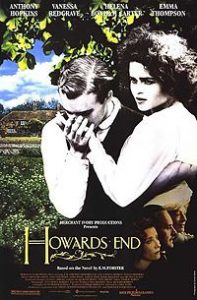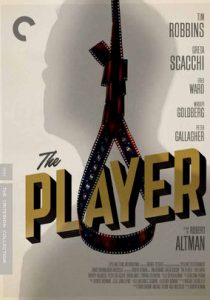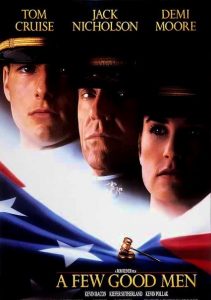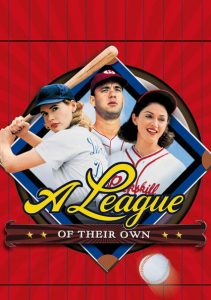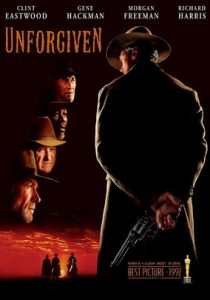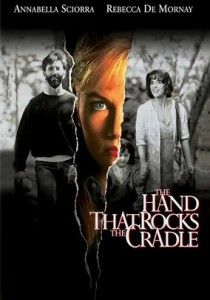Howards End-1992
Director James Ivory
Starring Anthony Hopkins, Emma Thompson, Helena Bonham Carter
Top 250 Films #79
Scott’s Review #702
Reviewed December 1, 2017
Grade: A-
Howards End is my favorite film adaptation of E.M. Forster’s novel, which was also adapted into a film during the 1980s (1985’s A Room with a View and 1987’s Maurice are the other two notable works).
The novels were written during the early 1900s and set during the same period, focusing on class relations in 20th-century England.
The film is lovely and picturesque, telling an interesting story about romance and drama between the haves and have-nots during this period.
The film was a success and received heaps of Academy Award nominations in 1993.
Margaret Schlegel (Emma Thompson), an upper-middle-class intellectual, part of London’s bourgeoisie, befriends wealthy and sophisticated, yet shockingly conservative Ruth Wilcox (Vanessa Redgrave).
The two women strike up a powerful friendship, which results in her beloved country home being left to Margaret when an ailing Mrs. Wilcox dies.
To complicate matters, Margaret falls in love with a businessman (and husband of Ruth), Henry (Anthony Hopkins), while Margaret’s sister Helen, briefly becomes engaged to Paul Wilcox, Henry’s son.
The two families’ lives further intersect when they wind up as neighbors in London and the true owner of the beloved “Howards End” is questioned.
Added to the mix are several other characters of various social backgrounds, having connections to the families.
The writing in Howard’s End is rich and emotional as each character is perfectly fleshed out this includes the supporting as well as the lead characters.
Thompson and Hopkins, both sensational actors, have tremendous chemistry together, and unsurprising was Thompson’s win for Best Actress during this competitive year. She carries the film seamlessly with her upper-middle-class ideals- not conservatively rich, but far from working-class- she epitomizes poise grace, and empathy for those less fortunate than she.
Hopkins, on the other hand, is calculating and confident, yet charismatic and sexy as an old-school, controlling businessman.
Somehow, these two characters complement each other exceptionally well despite their varied backgrounds
The role of Helen may very well be Helena Bonham Carter’s finest. Not being an enormous fan of the actress-overrated and too brooding in my opinion enjoys portraying an interesting character in Helen.
Lovelorn and earnest, yet somewhat oblivious, she develops a delicious romance with the young clerk, Leonard Bast, my favorite character in the film. Living with Jacky, a woman of dubious origins, he is the ultimate nice guy and sadly winds up down on his luck after heeding terrible business advice.
Bast, thanks in large part to actor Samuel West, who instills an innocent, good guy quality in his character, deserves major props.
The cinematography featured in Howards End is beautiful with extravagant outdoor scenes- the lavish gardens of Howards End- just ravishing and wonderful.
Kudos too to the art direction, set design, and costume department for making the film look so enchanting.
There is something so appealing about the look of this film and director, James Ivory, undoubtedly deserves praise for pulling it all together into a suave picture. Whether the scene calls for sun or rain, tranquil or bustling, every scene looks great.
If I were to knock any points from this fine film it would be at two hours and twenty-two minutes, Howards End does drag ever so slightly, and many scenes involve the characters merely having chats with each other, without much action.
But this criticism is small potatoes when compared to the exceptional writing and well-nuanced character development displayed throughout the piece.
Admittedly, and perhaps shamefully, I have not read any of the Forster novels, but Howards End appears to be the film that is most successfully adapted, gleaming with textured finesse, grace, and style.
With the film’s finest actors along for the experience, and intricate, fine story-telling, Howards End (1992) is a film well worth watching.
Oscar Nominations: 3 wins-Best Picture, Best Director-James Ivory, Best Actress-Emma Thompson (won), Best Supporting Actress-Vanessa Redgrave, Best Screenplay Based on Material Previously Produced or Published (won), Best Original Score, Best Art Direction (won), Best Cinematography, Best Costume Design
Independent Spirit Award Nominations: Best International Film
